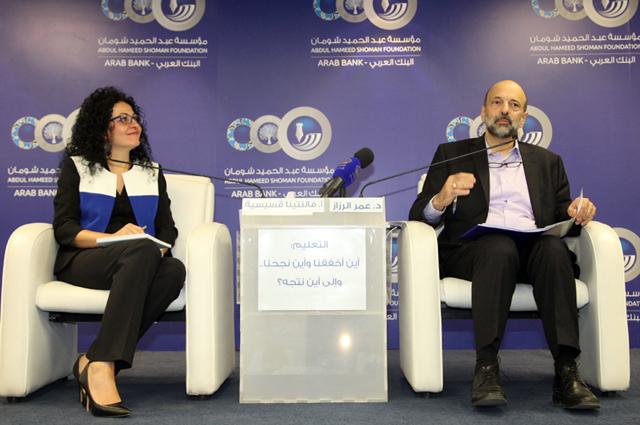You are here
Razzaz outlines Education Ministry’s plan for structural change
By Sawsan Tabazah - Sep 12,2017 - Last updated at Sep 12,2017

Minister of Education Omar Razzaz holds a lecture at Abdel Hameed Shoman Foundation on Monday (Petra photo)
AMMAN — Minister of Education Omar Razzaz on Monday held a lecture about the “reality of education” in Jordan, outlining the failures and successes the system has gone through in the last 70 years and announced the ministry’s plans for future development.
The lecture titled “Education: Where did we fail and succeed and where are we heading?” was held at Abdel Hameed Shoman Foundation, witnessed the attendance of the public, who listened to the ministry’s vision, focusing on the four main elements of the educational system: the teacher, student, school and curriculum.
The current educational system, which relies on instructing rather than using techniques that enhance critical thinking and innovation, is facing major problems, Razzaz said.
Taking the national strategy for Human Resources as the starting point, a draft on teaching Career Path will be issued by the end of 2017 in a bid to enhance career development for teachers, he added.
Training, evaluating, occupational licensing will be covered in the draft, which will be formulated in coordination with the Teachers Syndicate, the minister noted.
He stressed the importance of qualifying teachers before enroling them, and praised the “satisfying” outcomes of Queen Rania Teachers Academy, from which 200 teachers have so far graduated.
The minister stressed the need to take care of the first five years of the student’s life, and the importance to achieve social equality.
Noting the importance of pre-schools, he highlighted that they remain reserved to a small portion of the population, with only 13 per cent of the students, most of them in Amman, attending pre-schools.
The minister also highlighted the importance of making use of technological development in the sector in order to suit the variety of the students’ needs.
Razzaz revealed the ministry’s intention to use adaptive learning, an educational method that uses computers as interactive teaching devices, by connecting 2,700 schools to broadband.
He stressed the importance of creating programmes for extracurricular activities whereby students acquire and improve important skills, citing the national summer programme “Basma” that was implemented by the ministry.
There are plans to prevent violence in schools by measuring it through a national pact between students, teachers and parents, the minister added.
The transformation of Tawjihi (Secondary School Certificate examination) from a tool to evaluate performance to “a source of horror” affects a person’s work, marriage and even economic status, said Razzaz.
Razzaz discussed the ministry’s long term vision which focuses on strengths rather than weaknesses, and in which the student’s participation in extracurricular activities can be considered part of the mark in his/her admission to university.
He added that the ministry is examining the possibility of building an automated question bank that will enable students to take the examination at any time of the year.
Successes and failures
His Majesty the late King Hussein was aware of the importance of the human element for a country like Jordan which lacks natural resources, Razzaz noted, adding that educational achievements were shaped with the introduction of the law making elementary education obligatory.
Between 1963 and 1993, Jordan recorded the lowest rates in illiteracy among Arab countries, he added.
However, major defects have affected the system since then, including the lack of renewal and development in the educational institutions, the discrepancy between the quality of educational outputs and the needs of the market, in addition to the deterioration of teachers’ economic and social status.
Related Articles
AMMAN — The Cabinet on Sunday approved the mandating reasons for the by-law of the national centre for developing curricula to be sent to th
AMMAN — Minister of Education Omar Razzaz on Wednesday said that the ministry needs to build 600 new schools over the next 10 years to elimi
AMMAN — Education Minister Omar Razzaz on Friday announced plans to build 600 new schools over the next 10 years.In an interview with Jordan














